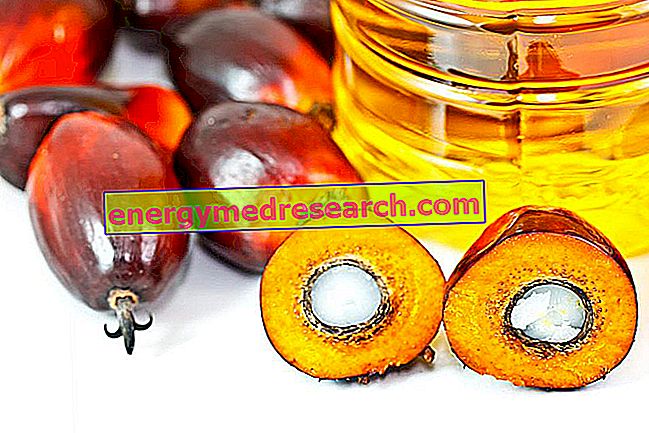
Palm oil, also known as " dendê oil" (from Portuguese), is an edible vegetable oil.
Palm oil is obtained through the mechanical pressing of the mesocarp (pulp) of the fruit of the so-called "oil palms". Obviously, this last term is quite generic and, in particular, the Species used are the "African Oil Palm" (Genus Elaeis, Specie guineensis ), the "American Oil Palm" (Genus Elaeis, Specie Oleifera ) and the " Palma Maripa ”(Genus Attalea, Species maripa ).
In its natural state, palm oil is reddish in color, due to the high beta-carotene content (pro vit. A) of the pulp from which it is extracted.
Palm oil should NOT be confused with "Palmisti Oil", derived from the seed of the fruit itself, or with "Coconut Oil", obtained from the seed of some palms of which the most famous is the Cocos nucifera . The differences between the two oils are:
the color: palm kernel oil is not red, but straw yellow
the saturated fat content: palm oil contains 41%, while palm oil and coconut oil bring 81% and 86%.
Together with coconut oil, palm kernel oil is one of the few vegetable fats with a semi-solid consistency (at room temperature); this is due to the prevalence of saturated fatty acids on unsaturated (instead liquid). Like all plant-based products, palm oil, palm kernel oil and coconut oil do NOT contain cholesterol.
Palm oil is a very common food in the whole tropical belt of Africa, in South-East Asia and in a part of South America, where the inhabitants use it for cooking. However, its predominant use is in the foreign food industry, regarding some features such as:
reduced cost
high oxidative stability of the refined oil.
The massive use of palm oil by industries has aroused the interest of some groups of environmental activists; the excellent economic yield of palm oil has led to the expansion of crops at the expense of Indonesian forests. This caused a significant reduction in the natural habitat of the orangutans, of which two species are in danger. One in particular, the Sumatra orangutan, has been called "critically endangered".
For this reason, in 2004, an industrial group was established called "Roundtable on Sustainable Palm Oil" (RSPO) which collaborates with palm oil production companies. Furthermore, in 1992, in response to questions on deforestation, the Malaysian government committed itself to limiting the expansion of oil palm plantations in order to maintain at least half of the national territory in woodland.
Palm oil is also "in the center of the crosshairs" of doctors and food professionals. As anticipated, despite being of vegetable origin, it has a very high content of saturated fatty acids. These, if in excess, are potentially responsible for raising cholesterol levels. Furthermore, most tropical oils are subjected to some industrial processes that improve their physical-chemical properties (smoke point, oxidation resistance, etc.), but often worsen their metabolic impact. However, it remains a duty to specify that, although it is far from being a "good fat", crude palm oil is a less questionable product of industrial palm kernel oil.



